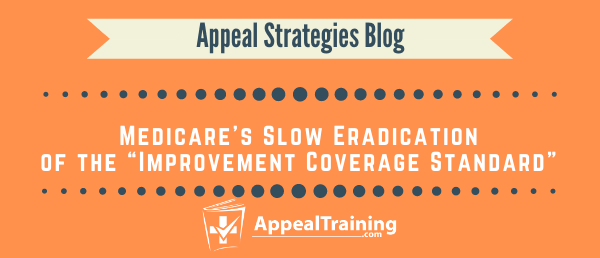CMS’s Ineffective Enforcement of Jimmo v Sebelius
It has been seven years since the legal victory Jimmo v Sebelius.
Jimmo v Seblius was a class action lawsuit alleging that Medicare payers were unfairly denying care based on an “Improvement Coverage Standard” which did not meet Medicare’s own coverage policy. Jimmo was considered a victory for patient’s advocates because the court ruled that doctors did not have to demonstrate the a proposed treatment, such as skilled nursing and skilled therapy, would result in improvement of the patient’s. Instead, payers had to allow patients access care under a lower threshold for care know as “maintenance” care.
In the Jimmo settlement agreement, CMS took the position allowing coverage for maintenance care was not an expansion of Medicare coverage. However, because so many internal reviewers were using the higher “improvement” standard when reviewing care, CMS agreed to review and update medical policy and also conduct an educational program to eradicate use of the Improvement standard by payers.
Unfortunately, seven years of review, rewriting and re-education seem to have done little to change access to care. This failure was self-disclosed in a recently released Health and Human Services (HHS) Transition Memo for President Biden.
“Unfortunately, many beneficiaries are still denied Medicare and access to necessary skilled care based on some variation of an “Improvement Standard.” CMS is failing to ensure that the Jimmo Settlement Agreement is being properly implemented. The inadequate education of Medicare representatives, contractors, and providers about the Settlement results in continuing harm to Medicare beneficiaries in need of maintenance nursing and/or therapy services who are improperly denied access to appropriate Medicare coverage and care. Too often, when care is provided, the costs are inappropriately shifted to beneficiaries, families, and state Medicaid programs,” states the 2021 Biden Transition memo.
Because of the lack of success of the Jimmo education, healthcare organizations providing skilled nursing and skilled therapy services often must appeal medical necessity denials that appear to be related to wrongful use of an Improvement Standard. Such appeals further document the need for the recommended care to slow or arrest disease progression.
Many such appeals make no reference to the Jimmo settlement agreement. However, the clear terms of the settlement may be helpful in elevating the claim for both clinical and legal compliance review with payers. For example, skilled nursing and skilled therapy appeals may benefit from the addition of the following paragraph:
Please review this denial for compliance with the 2013 Jimmo Settlement Agreement. This legal agreement requires manual revisions to restate a “maintenance coverage standard” for both skilled nursing and therapy services under these benefits:
Skilled nursing services would be covered where such skilled nursing services are necessary to maintain the patient’s current condition or prevent or slow further deterioration so long as the beneficiary requires skilled care for the services to be safely and effectively provided.
Skilled therapy services are covered when an individualized assessment of the patient’s clinical condition demonstrates that the specialized judgment, knowledge, and skills of a qualified therapist (“skilled care”) are necessary for the performance of a safe and effective maintenance program. Such a maintenance program to maintain the patient’s current condition or to prevent or slow further deterioration is covered so long as the beneficiary requires skilled care for the safe and effective performance of the program.
See https://www.cms.gov/Center/Special-Topic/Jimmo-Center for more information related to maintenance coverage standard enforcement. Further information about the history of Jimmo and related litigation is at:
https://medicareadvocacy.org/guest-author-the-myth-of-the-medicare-improvement-standard/




Leave A Response